BCOM101: Interest-Based Negotiation vs. Position-Based Negotiation
VerifiedAdded on 2023/06/07
|9
|2086
|408
Essay
AI Summary
This assignment consists of an essay and a self-reflective summary focusing on negotiation strategies in business communication. The essay argues that interest-based negotiations lead to better outcomes compared to position-based negotiations, emphasizing collaboration, trust, and mutually beneficial solutions. It contrasts the win-lose nature of positional negotiation with the win-win approach of interest-based negotiation, highlighting the potential for damaged relationships and breakdowns in communication with the former. The self-reflective summary discusses the student's learning from researching negotiation approaches, particularly the differences between position-based and interest-based methods, and how this knowledge will be applied in future business deals to foster cooperation and achieve optimal outcomes. The assignment concludes that an interest-based approach is generally preferable for achieving desired results, building trust, and maintaining positive relationships.

Business Communication
1
1
Paraphrase This Document
Need a fresh take? Get an instant paraphrase of this document with our AI Paraphraser

Contents
Part-1-Essay.....................................................................................................................................3
1ntroduction.....................................................................................................................................3
Interest-based negotiations achieve better outcomes than position-based negotiations..................3
Conclusion.......................................................................................................................................5
Part-2 Feed Forward Exercise (Summary)......................................................................................6
References........................................................................................................................................8
2
Part-1-Essay.....................................................................................................................................3
1ntroduction.....................................................................................................................................3
Interest-based negotiations achieve better outcomes than position-based negotiations..................3
Conclusion.......................................................................................................................................5
Part-2 Feed Forward Exercise (Summary)......................................................................................6
References........................................................................................................................................8
2
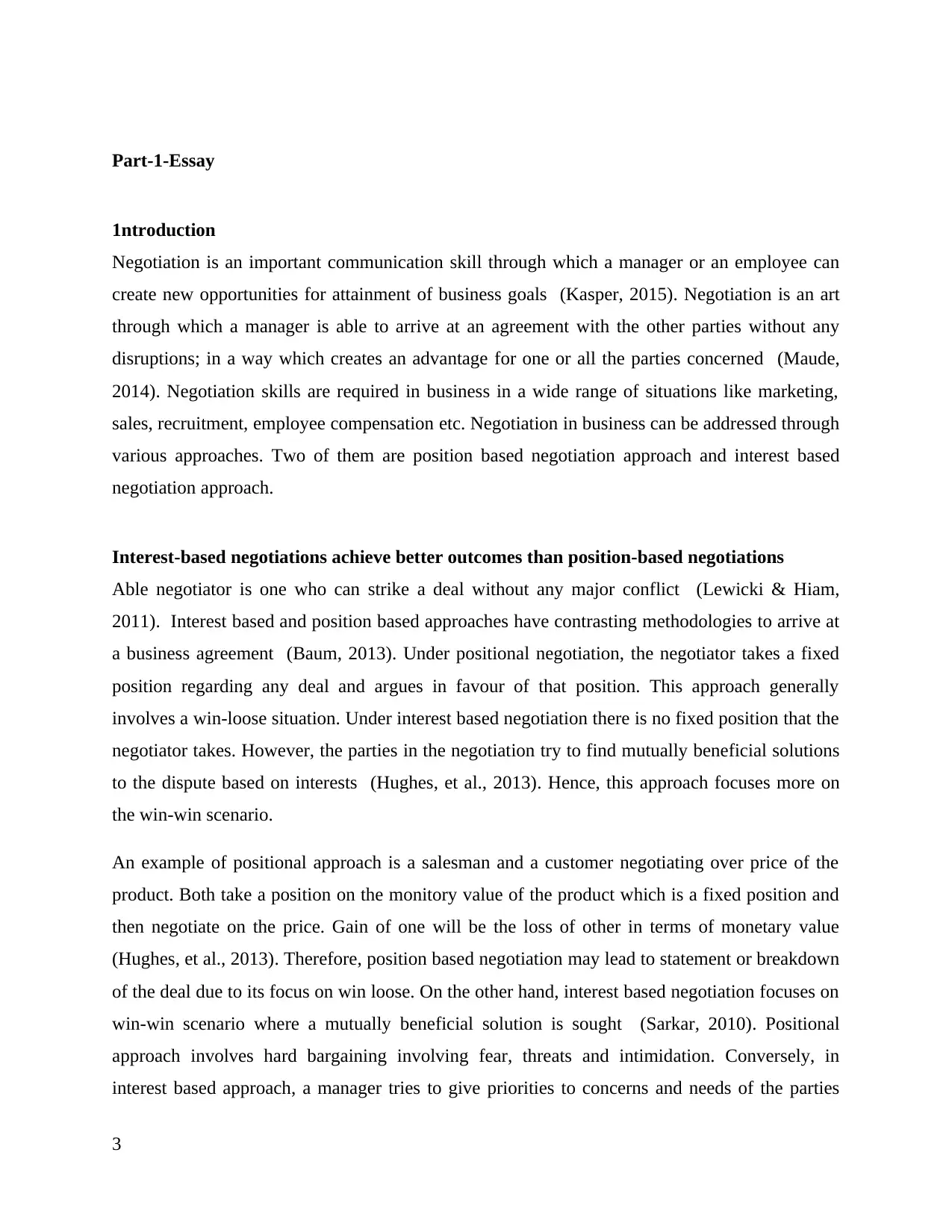
Part-1-Essay
1ntroduction
Negotiation is an important communication skill through which a manager or an employee can
create new opportunities for attainment of business goals (Kasper, 2015). Negotiation is an art
through which a manager is able to arrive at an agreement with the other parties without any
disruptions; in a way which creates an advantage for one or all the parties concerned (Maude,
2014). Negotiation skills are required in business in a wide range of situations like marketing,
sales, recruitment, employee compensation etc. Negotiation in business can be addressed through
various approaches. Two of them are position based negotiation approach and interest based
negotiation approach.
Interest-based negotiations achieve better outcomes than position-based negotiations
Able negotiator is one who can strike a deal without any major conflict (Lewicki & Hiam,
2011). Interest based and position based approaches have contrasting methodologies to arrive at
a business agreement (Baum, 2013). Under positional negotiation, the negotiator takes a fixed
position regarding any deal and argues in favour of that position. This approach generally
involves a win-loose situation. Under interest based negotiation there is no fixed position that the
negotiator takes. However, the parties in the negotiation try to find mutually beneficial solutions
to the dispute based on interests (Hughes, et al., 2013). Hence, this approach focuses more on
the win-win scenario.
An example of positional approach is a salesman and a customer negotiating over price of the
product. Both take a position on the monitory value of the product which is a fixed position and
then negotiate on the price. Gain of one will be the loss of other in terms of monetary value
(Hughes, et al., 2013). Therefore, position based negotiation may lead to statement or breakdown
of the deal due to its focus on win loose. On the other hand, interest based negotiation focuses on
win-win scenario where a mutually beneficial solution is sought (Sarkar, 2010). Positional
approach involves hard bargaining involving fear, threats and intimidation. Conversely, in
interest based approach, a manager tries to give priorities to concerns and needs of the parties
3
1ntroduction
Negotiation is an important communication skill through which a manager or an employee can
create new opportunities for attainment of business goals (Kasper, 2015). Negotiation is an art
through which a manager is able to arrive at an agreement with the other parties without any
disruptions; in a way which creates an advantage for one or all the parties concerned (Maude,
2014). Negotiation skills are required in business in a wide range of situations like marketing,
sales, recruitment, employee compensation etc. Negotiation in business can be addressed through
various approaches. Two of them are position based negotiation approach and interest based
negotiation approach.
Interest-based negotiations achieve better outcomes than position-based negotiations
Able negotiator is one who can strike a deal without any major conflict (Lewicki & Hiam,
2011). Interest based and position based approaches have contrasting methodologies to arrive at
a business agreement (Baum, 2013). Under positional negotiation, the negotiator takes a fixed
position regarding any deal and argues in favour of that position. This approach generally
involves a win-loose situation. Under interest based negotiation there is no fixed position that the
negotiator takes. However, the parties in the negotiation try to find mutually beneficial solutions
to the dispute based on interests (Hughes, et al., 2013). Hence, this approach focuses more on
the win-win scenario.
An example of positional approach is a salesman and a customer negotiating over price of the
product. Both take a position on the monitory value of the product which is a fixed position and
then negotiate on the price. Gain of one will be the loss of other in terms of monetary value
(Hughes, et al., 2013). Therefore, position based negotiation may lead to statement or breakdown
of the deal due to its focus on win loose. On the other hand, interest based negotiation focuses on
win-win scenario where a mutually beneficial solution is sought (Sarkar, 2010). Positional
approach involves hard bargaining involving fear, threats and intimidation. Conversely, in
interest based approach, a manager tries to give priorities to concerns and needs of the parties
3
⊘ This is a preview!⊘
Do you want full access?
Subscribe today to unlock all pages.

Trusted by 1+ million students worldwide
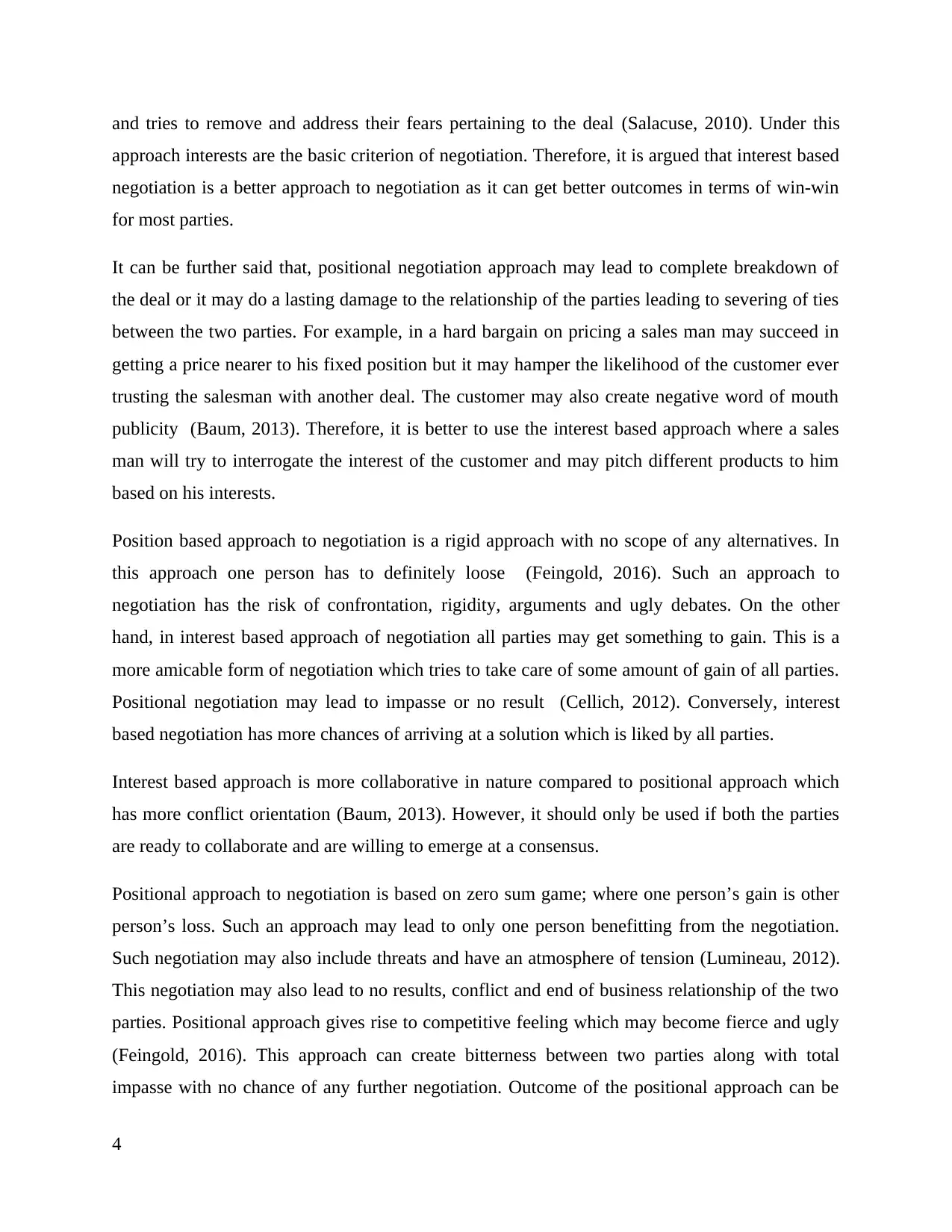
and tries to remove and address their fears pertaining to the deal (Salacuse, 2010). Under this
approach interests are the basic criterion of negotiation. Therefore, it is argued that interest based
negotiation is a better approach to negotiation as it can get better outcomes in terms of win-win
for most parties.
It can be further said that, positional negotiation approach may lead to complete breakdown of
the deal or it may do a lasting damage to the relationship of the parties leading to severing of ties
between the two parties. For example, in a hard bargain on pricing a sales man may succeed in
getting a price nearer to his fixed position but it may hamper the likelihood of the customer ever
trusting the salesman with another deal. The customer may also create negative word of mouth
publicity (Baum, 2013). Therefore, it is better to use the interest based approach where a sales
man will try to interrogate the interest of the customer and may pitch different products to him
based on his interests.
Position based approach to negotiation is a rigid approach with no scope of any alternatives. In
this approach one person has to definitely loose (Feingold, 2016). Such an approach to
negotiation has the risk of confrontation, rigidity, arguments and ugly debates. On the other
hand, in interest based approach of negotiation all parties may get something to gain. This is a
more amicable form of negotiation which tries to take care of some amount of gain of all parties.
Positional negotiation may lead to impasse or no result (Cellich, 2012). Conversely, interest
based negotiation has more chances of arriving at a solution which is liked by all parties.
Interest based approach is more collaborative in nature compared to positional approach which
has more conflict orientation (Baum, 2013). However, it should only be used if both the parties
are ready to collaborate and are willing to emerge at a consensus.
Positional approach to negotiation is based on zero sum game; where one person’s gain is other
person’s loss. Such an approach may lead to only one person benefitting from the negotiation.
Such negotiation may also include threats and have an atmosphere of tension (Lumineau, 2012).
This negotiation may also lead to no results, conflict and end of business relationship of the two
parties. Positional approach gives rise to competitive feeling which may become fierce and ugly
(Feingold, 2016). This approach can create bitterness between two parties along with total
impasse with no chance of any further negotiation. Outcome of the positional approach can be
4
approach interests are the basic criterion of negotiation. Therefore, it is argued that interest based
negotiation is a better approach to negotiation as it can get better outcomes in terms of win-win
for most parties.
It can be further said that, positional negotiation approach may lead to complete breakdown of
the deal or it may do a lasting damage to the relationship of the parties leading to severing of ties
between the two parties. For example, in a hard bargain on pricing a sales man may succeed in
getting a price nearer to his fixed position but it may hamper the likelihood of the customer ever
trusting the salesman with another deal. The customer may also create negative word of mouth
publicity (Baum, 2013). Therefore, it is better to use the interest based approach where a sales
man will try to interrogate the interest of the customer and may pitch different products to him
based on his interests.
Position based approach to negotiation is a rigid approach with no scope of any alternatives. In
this approach one person has to definitely loose (Feingold, 2016). Such an approach to
negotiation has the risk of confrontation, rigidity, arguments and ugly debates. On the other
hand, in interest based approach of negotiation all parties may get something to gain. This is a
more amicable form of negotiation which tries to take care of some amount of gain of all parties.
Positional negotiation may lead to impasse or no result (Cellich, 2012). Conversely, interest
based negotiation has more chances of arriving at a solution which is liked by all parties.
Interest based approach is more collaborative in nature compared to positional approach which
has more conflict orientation (Baum, 2013). However, it should only be used if both the parties
are ready to collaborate and are willing to emerge at a consensus.
Positional approach to negotiation is based on zero sum game; where one person’s gain is other
person’s loss. Such an approach may lead to only one person benefitting from the negotiation.
Such negotiation may also include threats and have an atmosphere of tension (Lumineau, 2012).
This negotiation may also lead to no results, conflict and end of business relationship of the two
parties. Positional approach gives rise to competitive feeling which may become fierce and ugly
(Feingold, 2016). This approach can create bitterness between two parties along with total
impasse with no chance of any further negotiation. Outcome of the positional approach can be
4
Paraphrase This Document
Need a fresh take? Get an instant paraphrase of this document with our AI Paraphraser
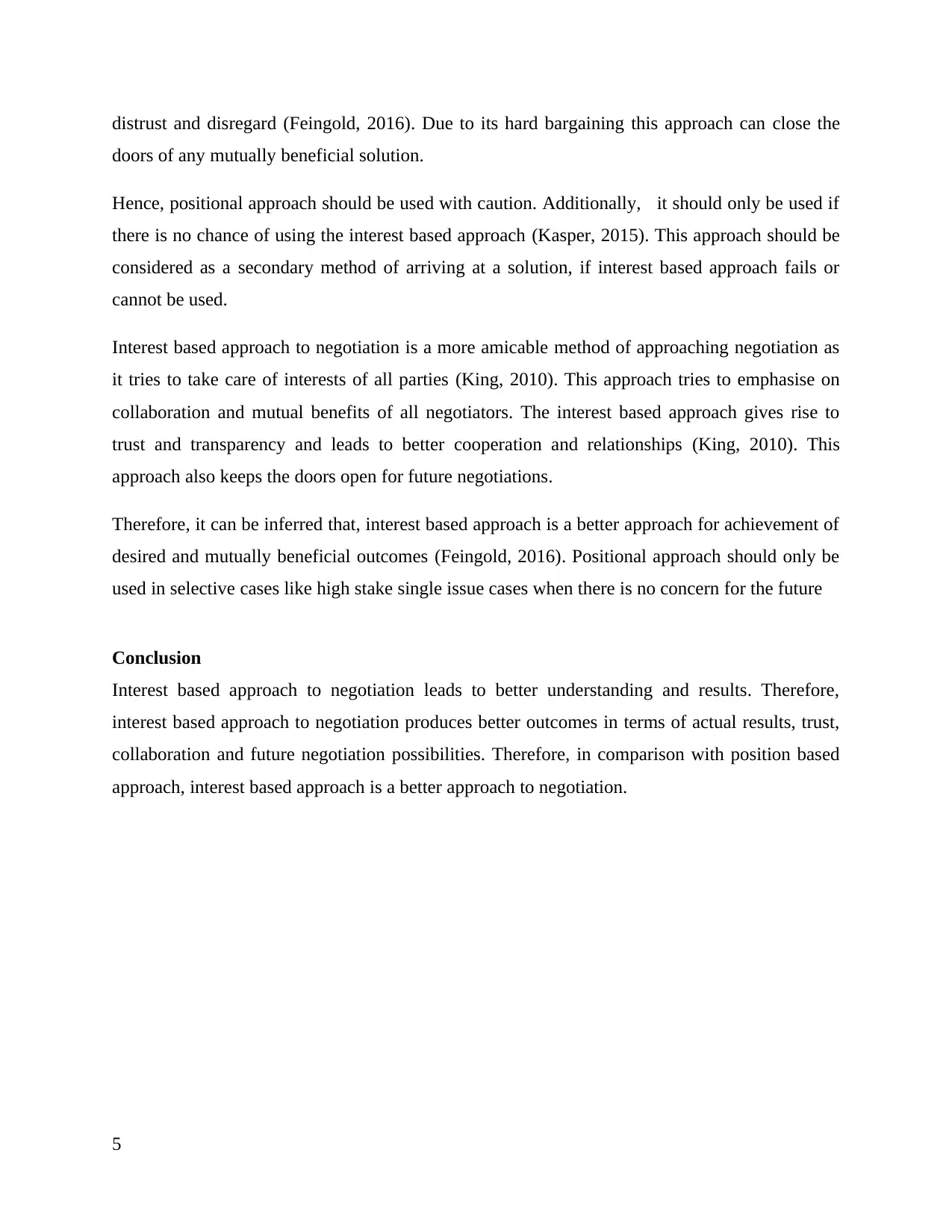
distrust and disregard (Feingold, 2016). Due to its hard bargaining this approach can close the
doors of any mutually beneficial solution.
Hence, positional approach should be used with caution. Additionally, it should only be used if
there is no chance of using the interest based approach (Kasper, 2015). This approach should be
considered as a secondary method of arriving at a solution, if interest based approach fails or
cannot be used.
Interest based approach to negotiation is a more amicable method of approaching negotiation as
it tries to take care of interests of all parties (King, 2010). This approach tries to emphasise on
collaboration and mutual benefits of all negotiators. The interest based approach gives rise to
trust and transparency and leads to better cooperation and relationships (King, 2010). This
approach also keeps the doors open for future negotiations.
Therefore, it can be inferred that, interest based approach is a better approach for achievement of
desired and mutually beneficial outcomes (Feingold, 2016). Positional approach should only be
used in selective cases like high stake single issue cases when there is no concern for the future
Conclusion
Interest based approach to negotiation leads to better understanding and results. Therefore,
interest based approach to negotiation produces better outcomes in terms of actual results, trust,
collaboration and future negotiation possibilities. Therefore, in comparison with position based
approach, interest based approach is a better approach to negotiation.
5
doors of any mutually beneficial solution.
Hence, positional approach should be used with caution. Additionally, it should only be used if
there is no chance of using the interest based approach (Kasper, 2015). This approach should be
considered as a secondary method of arriving at a solution, if interest based approach fails or
cannot be used.
Interest based approach to negotiation is a more amicable method of approaching negotiation as
it tries to take care of interests of all parties (King, 2010). This approach tries to emphasise on
collaboration and mutual benefits of all negotiators. The interest based approach gives rise to
trust and transparency and leads to better cooperation and relationships (King, 2010). This
approach also keeps the doors open for future negotiations.
Therefore, it can be inferred that, interest based approach is a better approach for achievement of
desired and mutually beneficial outcomes (Feingold, 2016). Positional approach should only be
used in selective cases like high stake single issue cases when there is no concern for the future
Conclusion
Interest based approach to negotiation leads to better understanding and results. Therefore,
interest based approach to negotiation produces better outcomes in terms of actual results, trust,
collaboration and future negotiation possibilities. Therefore, in comparison with position based
approach, interest based approach is a better approach to negotiation.
5

Part-2 Feed Forward Exercise (Summary)
From my research on approaches of negotiation, I have learnt that, negotiation is the art of
reaching an agreement over any deal. I have understood that, negotiation is a major skill of
business communication which can help me to reach a breakthrough in business situations such
as, marketing or a sales deal or a recruitment negotiation with a prospective employee.
My research brought to light that, there are two major approaches of negotiation. These are,
position based approach and interest based approach. Both approaches take contradicting
viewpoint regarding the way in which negotiation should be done.
I have learnt that, positional approach is based on zero sum game where one person’s win is
another person’s loss. In this approach a fixed position is taken by the negotiator and then
negotiation is done from that position. After the negotiation process is complete one person
would have deviated from his stated position in order for other person to win his stance.
Therefore, I have realised that, in this approach one person’s gain is another person’s loss.
Major learning from my research on position based approach has taught me that there can only
be one outcome in this negotiation approach; that is, victory or loss. Therefore, in my opinion,
such a negotiation approach can lead to an impasse where bath or all parties are not ready to
vacate their position.
As per my understanding, positional approach can also hamper any future negotiation or future
relationship between me and the other party. If I use this negotiation technique, other parties may
feel cheated. Therefore, in any future business deal I should use this approach when only one
solution is possible; stakes are high and no concern for future relationships are there.
On the other hand, my research on interest based approach reveals that, this approach tries to
keep all parties’ interest in focus. There is no fixed position and that solution is sought which
benefits maximum concerns and interests of the negotiators.
Additionally, to my understanding, interest based approach to negotiation helps in fostering ties
of trust and transparency among all parties. This approach is not based on a single solution or
win and loss. It is based on the best possible or the optimal solution which can be arrived at.
6
From my research on approaches of negotiation, I have learnt that, negotiation is the art of
reaching an agreement over any deal. I have understood that, negotiation is a major skill of
business communication which can help me to reach a breakthrough in business situations such
as, marketing or a sales deal or a recruitment negotiation with a prospective employee.
My research brought to light that, there are two major approaches of negotiation. These are,
position based approach and interest based approach. Both approaches take contradicting
viewpoint regarding the way in which negotiation should be done.
I have learnt that, positional approach is based on zero sum game where one person’s win is
another person’s loss. In this approach a fixed position is taken by the negotiator and then
negotiation is done from that position. After the negotiation process is complete one person
would have deviated from his stated position in order for other person to win his stance.
Therefore, I have realised that, in this approach one person’s gain is another person’s loss.
Major learning from my research on position based approach has taught me that there can only
be one outcome in this negotiation approach; that is, victory or loss. Therefore, in my opinion,
such a negotiation approach can lead to an impasse where bath or all parties are not ready to
vacate their position.
As per my understanding, positional approach can also hamper any future negotiation or future
relationship between me and the other party. If I use this negotiation technique, other parties may
feel cheated. Therefore, in any future business deal I should use this approach when only one
solution is possible; stakes are high and no concern for future relationships are there.
On the other hand, my research on interest based approach reveals that, this approach tries to
keep all parties’ interest in focus. There is no fixed position and that solution is sought which
benefits maximum concerns and interests of the negotiators.
Additionally, to my understanding, interest based approach to negotiation helps in fostering ties
of trust and transparency among all parties. This approach is not based on a single solution or
win and loss. It is based on the best possible or the optimal solution which can be arrived at.
6
⊘ This is a preview!⊘
Do you want full access?
Subscribe today to unlock all pages.

Trusted by 1+ million students worldwide
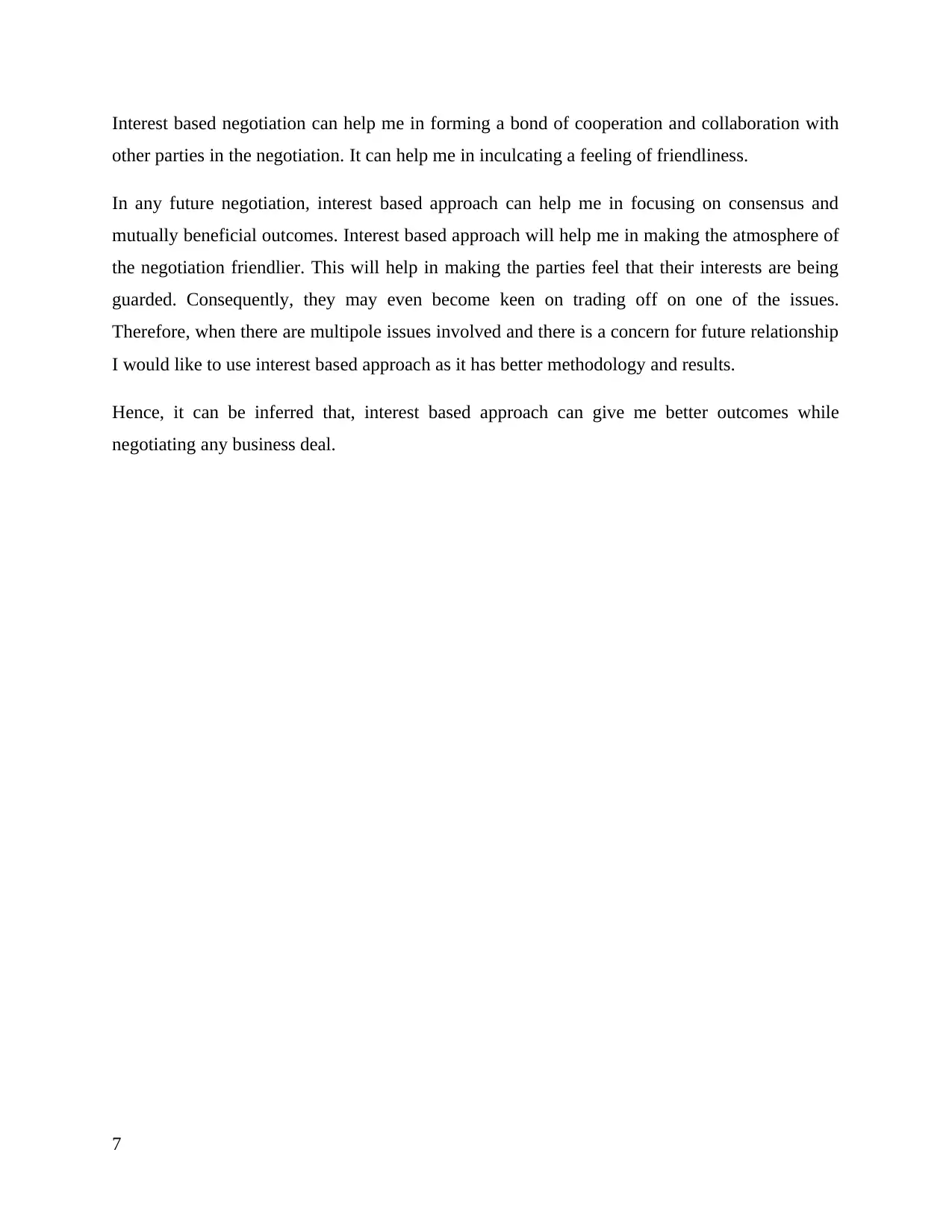
Interest based negotiation can help me in forming a bond of cooperation and collaboration with
other parties in the negotiation. It can help me in inculcating a feeling of friendliness.
In any future negotiation, interest based approach can help me in focusing on consensus and
mutually beneficial outcomes. Interest based approach will help me in making the atmosphere of
the negotiation friendlier. This will help in making the parties feel that their interests are being
guarded. Consequently, they may even become keen on trading off on one of the issues.
Therefore, when there are multipole issues involved and there is a concern for future relationship
I would like to use interest based approach as it has better methodology and results.
Hence, it can be inferred that, interest based approach can give me better outcomes while
negotiating any business deal.
7
other parties in the negotiation. It can help me in inculcating a feeling of friendliness.
In any future negotiation, interest based approach can help me in focusing on consensus and
mutually beneficial outcomes. Interest based approach will help me in making the atmosphere of
the negotiation friendlier. This will help in making the parties feel that their interests are being
guarded. Consequently, they may even become keen on trading off on one of the issues.
Therefore, when there are multipole issues involved and there is a concern for future relationship
I would like to use interest based approach as it has better methodology and results.
Hence, it can be inferred that, interest based approach can give me better outcomes while
negotiating any business deal.
7
Paraphrase This Document
Need a fresh take? Get an instant paraphrase of this document with our AI Paraphraser
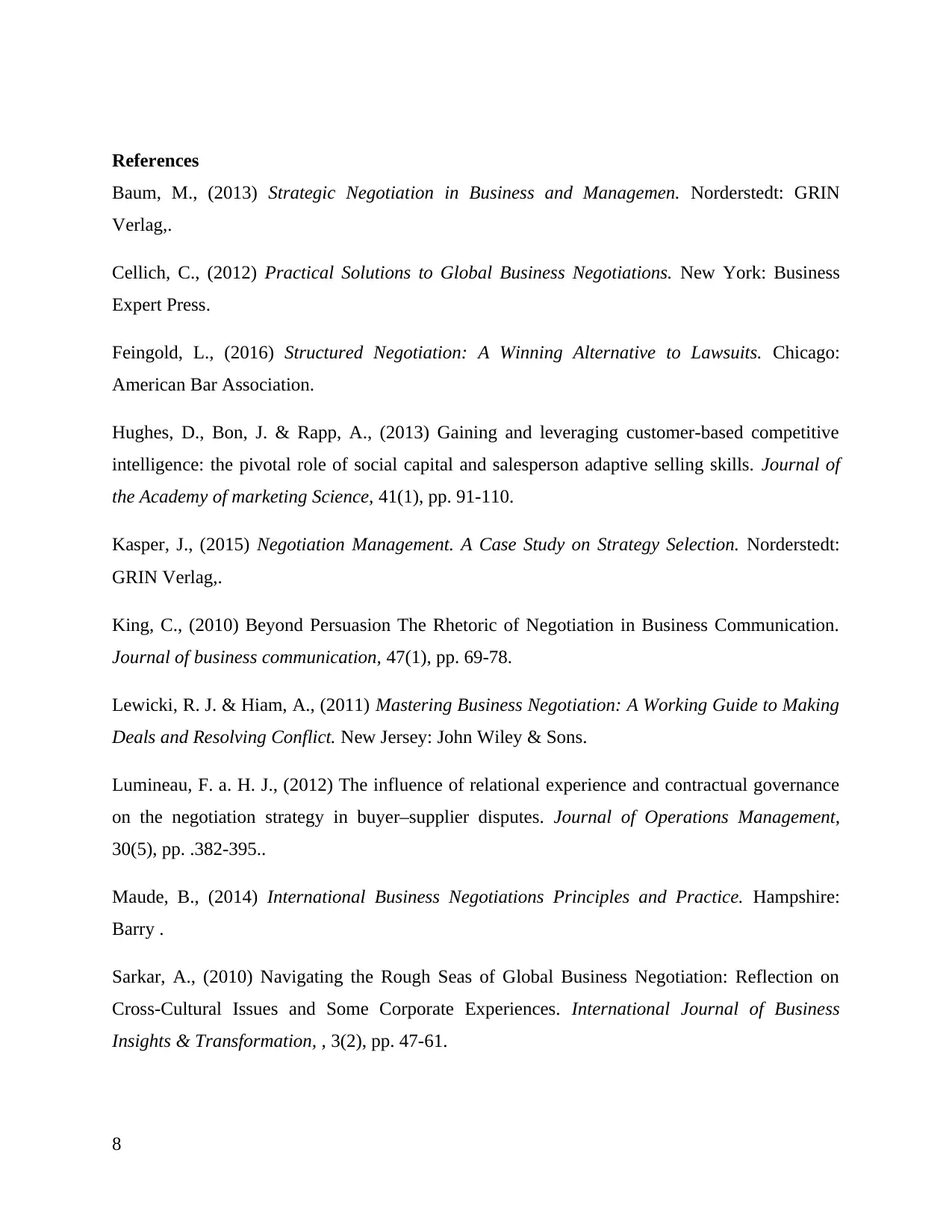
References
Baum, M., (2013) Strategic Negotiation in Business and Managemen. Norderstedt: GRIN
Verlag,.
Cellich, C., (2012) Practical Solutions to Global Business Negotiations. New York: Business
Expert Press.
Feingold, L., (2016) Structured Negotiation: A Winning Alternative to Lawsuits. Chicago:
American Bar Association.
Hughes, D., Bon, J. & Rapp, A., (2013) Gaining and leveraging customer-based competitive
intelligence: the pivotal role of social capital and salesperson adaptive selling skills. Journal of
the Academy of marketing Science, 41(1), pp. 91-110.
Kasper, J., (2015) Negotiation Management. A Case Study on Strategy Selection. Norderstedt:
GRIN Verlag,.
King, C., (2010) Beyond Persuasion The Rhetoric of Negotiation in Business Communication.
Journal of business communication, 47(1), pp. 69-78.
Lewicki, R. J. & Hiam, A., (2011) Mastering Business Negotiation: A Working Guide to Making
Deals and Resolving Conflict. New Jersey: John Wiley & Sons.
Lumineau, F. a. H. J., (2012) The influence of relational experience and contractual governance
on the negotiation strategy in buyer–supplier disputes. Journal of Operations Management,
30(5), pp. .382-395..
Maude, B., (2014) International Business Negotiations Principles and Practice. Hampshire:
Barry .
Sarkar, A., (2010) Navigating the Rough Seas of Global Business Negotiation: Reflection on
Cross-Cultural Issues and Some Corporate Experiences. International Journal of Business
Insights & Transformation, , 3(2), pp. 47-61.
8
Baum, M., (2013) Strategic Negotiation in Business and Managemen. Norderstedt: GRIN
Verlag,.
Cellich, C., (2012) Practical Solutions to Global Business Negotiations. New York: Business
Expert Press.
Feingold, L., (2016) Structured Negotiation: A Winning Alternative to Lawsuits. Chicago:
American Bar Association.
Hughes, D., Bon, J. & Rapp, A., (2013) Gaining and leveraging customer-based competitive
intelligence: the pivotal role of social capital and salesperson adaptive selling skills. Journal of
the Academy of marketing Science, 41(1), pp. 91-110.
Kasper, J., (2015) Negotiation Management. A Case Study on Strategy Selection. Norderstedt:
GRIN Verlag,.
King, C., (2010) Beyond Persuasion The Rhetoric of Negotiation in Business Communication.
Journal of business communication, 47(1), pp. 69-78.
Lewicki, R. J. & Hiam, A., (2011) Mastering Business Negotiation: A Working Guide to Making
Deals and Resolving Conflict. New Jersey: John Wiley & Sons.
Lumineau, F. a. H. J., (2012) The influence of relational experience and contractual governance
on the negotiation strategy in buyer–supplier disputes. Journal of Operations Management,
30(5), pp. .382-395..
Maude, B., (2014) International Business Negotiations Principles and Practice. Hampshire:
Barry .
Sarkar, A., (2010) Navigating the Rough Seas of Global Business Negotiation: Reflection on
Cross-Cultural Issues and Some Corporate Experiences. International Journal of Business
Insights & Transformation, , 3(2), pp. 47-61.
8

9
⊘ This is a preview!⊘
Do you want full access?
Subscribe today to unlock all pages.

Trusted by 1+ million students worldwide
1 out of 9
Related Documents
Your All-in-One AI-Powered Toolkit for Academic Success.
+13062052269
info@desklib.com
Available 24*7 on WhatsApp / Email
![[object Object]](/_next/static/media/star-bottom.7253800d.svg)
Unlock your academic potential
Copyright © 2020–2026 A2Z Services. All Rights Reserved. Developed and managed by ZUCOL.





